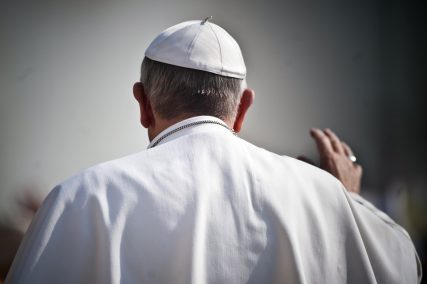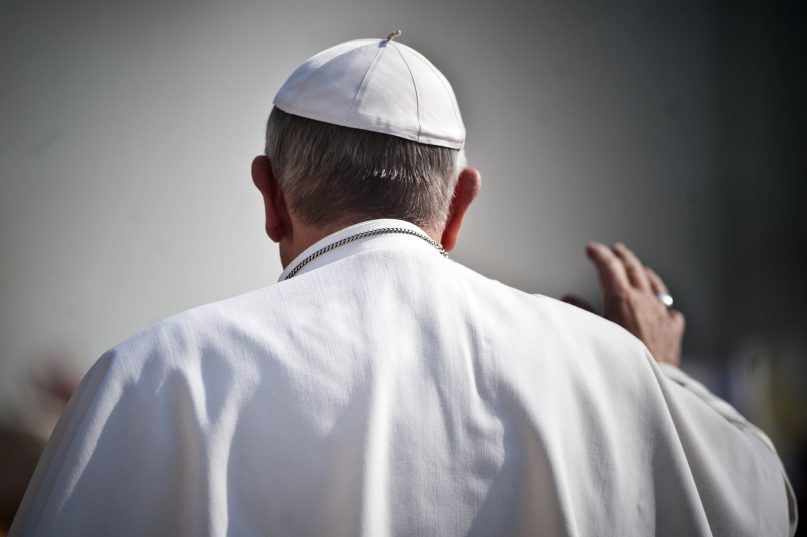 NEW YORK (RNS) The Rev. Martin Schlag is a trained economist as well as a Catholic moral theologian, and when he first read some of Pope Francis’ powerful critiques of the current free market system he had the same thought a lot of Americans did: “Just horrible.”
NEW YORK (RNS) The Rev. Martin Schlag is a trained economist as well as a Catholic moral theologian, and when he first read some of Pope Francis’ powerful critiques of the current free market system he had the same thought a lot of Americans did: “Just horrible.”
But at a meeting on Monday (May 11) at the Harvard Club, Schlag, an Austrian-born priest who teaches economics at an Opus Dei-run university in Rome, reassured a group of Catholics, many from the world of business and finance, that Francis’ views on capitalism aren’t actually as bad as he feared.
“You can get the impression that the pope is against capitalism,” said Schlag, who heads the Markets, Culture and Ethics Research Centre at the Pontifical University of the Holy Cross, located near the Vatican.
But he explained that what Francis — the first Latin American pope — understands as capitalism is in fact the “crony capitalism” that is found in the pontiff’s native Argentina and much of Latin America. Schlag defined “crony capitalism” as “a form of capitalism where people get rich not because of their work but because of their friendships and political connections and the privileges they have.”
That is quite different from the American system, he said.
“Does the pope understand the United States? I think he doesn’t know the United States,” said Schlag, who is also an adviser to the Vatican department that deals with social and economic issues.
Schlag’s view that Francis is conditioned by his Argentine experience is shared by many who seek to contextualize the pope’s criticisms, but it is not shared by all those who know the pope.
“Of course he knows” the U.S. because he has been meeting with U.S. bishops for years, and even more frequently since he became pope, Cardinal Oscar Rodriguez Maradiaga of Honduras, a senior adviser to Francis, said during a visit to Washington last month.
“He knows the Americans and he knows the culture as well,” said Rodriguez Maradiaga, who is also an outspoken critic of U.S.-style capitalism.
Still, Schlag said he believes that the pontiff’s Sept. 22-27 visit to the U.S., his first to the country, will be an opportunity for Francis to learn more about America and to appreciate the positive aspects of what Schlag said is the most successful economy in history.
That would come as a relief to Catholic conservatives and big donors who have voiced serious concerns about the pope’s frequents blasts against wealth and capitalism.
From the moment he was elected in March 2013, Francis has said he wants to make service to the poor and battling economic injustice a priority for the church, and in a landmark document published near the end of 2013, Francis ripped what he called “an economy of exclusion and inequality.”
In that document, called an apostolic exhortation, Francis blamed ideologies that “defend the absolute autonomy of the marketplace and financial speculation,” and he singled out for special scorn “trickle-down theories” that promote tax cuts for the wealthy and have been popular among U.S. Republicans.
Because of those remarks, Francis has often been called a Marxist or a socialist — a label he rejects — even as he maintains his critiques of the free market, going so far as to accuse the large “idolatrous economies” that manufacture weapons and foment wars to pad their bottom lines.
Those comments, in June of last year, prompted a writer at The Economist magazine to charge Francis with being an “ultra-radical” who follows Vladimir Lenin, the founder of Soviet communism.
Schlag rejected the idea that Francis is a Marxist, though he said the pope does favor “collectivist” or “corporatist” economic solutions and would prefer cooperatives and similar models — models that he said would obviously not work for a modern financial industry such as the one that powers the New York economy and much of the world.
Schlag said one source of the concerns for economic conservatives can be chalked up to a failure to communicate — a matter of different cultures and even languages talking past each other.
Not only does Francis not know the U.S., he said, but he does not know English especially well. When the pope denounces economic “inequality,” for example, what he means in Spanish is an “unjust inequality” caused by unfair competition or a rigged market — not just income disparities.
Also, the pope’s critiques of unregulated free markets are taken as condemnations of all markets. In reality, Schlag said, “A pure or unfettered or unbridled market doesn’t work and it doesn’t exist.”
“Just because the pope said it doesn’t mean you have to ridicule it or be against it,” he said.
“The market is something fragile. It’s something which isn’t just an economic fact … but it is an ethical and cultural achievement which needs laws and needs ethics, and needs culture — a culture of thrift,” he said. “And also it needs warmheartedness, which Pope Francis is trying to bring. Because otherwise it won’t be sustainable.”
YS/MG END GIBSON





